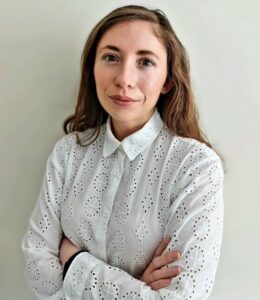 How did you first develop an interest in digital learning?
How did you first develop an interest in digital learning?I have always been interested in evidence-based approaches to enhance learning and cognition in children and adolescents. My background is in psychology, and my PhD was in school-based brain training. That research laid the groundwork for this project. I really believe that digital learning is the future of education, and I want to be involved in research that has the potential to make a real-world impact.
Today, my research focuses on the use of Minecraft Education in primary schools. Minecraft Education is a digital game-based learning platform that can be used as a tool for teaching, learning and assessment. As part of a collaborative project between the Institute of Education and Dream Space at Microsoft Ireland, we want to investigate the evidence behind using Minecraft Education in schools and determine how effective it is.
Over the last 18 months, we have carried out four different research studies, each one exploring a different aspect of learning with Minecraft Education. We first systematically reviewed all the evidence to date on digital game-based learning with Minecraft and took a close look at whether it can improve students’ learning outcomes. We then conducted a student study and a teacher study in collaboration with Ireland’s Future is MINE, a national initiative between Dream Space at Microsoft and RTÉ. This initiative encouraged primary schools to use Minecraft Education in the classroom, and saw over 100 classes take part. As part of a competition, students built a sustainable version of their local community in Minecraft Education. Our research looked at both student and teacher experiences of using Minecraft Education during the initiative, so we got both perspectives.
Our final study has been a randomised controlled trial, which is challenging to do in a primary school setting, looking at whether Minecraft Education can improve students’ spatial reasoning. If you think about what Minecraft Education is, it’s using blocks to build structures, so spatial reasoning is embedded into the platform.
“We designed the study using rigorous, best-practice methodologies. Over 800 children throughout Ireland took part in our study this year, and we are now in the process of analysing that data. Nothing like this has ever been done before, so it’s the first of its kind.”
It has been really interesting to hear what students have to say. We have given students a voice through this work – and student voice matters when we talk about implementing change in the educational system. It is clear that students are enthusiastic about using Minecraft Education as a learning tool. It enables them to become engaged in their learning, to work with their classmates, to be creative and to develop their digital skills.
Our findings show that teachers are also positive about Minecraft Education in the classroom. They have described it as a powerful tool for fostering creativity and collaboration among students, as well as supporting curricular content and student agency. Students can take ownership of their learning experiences, which can help children to stay motivated and engaged in learning and education.
“Most interestingly, teachers talked about Minecraft Education as a tool for promoting inclusive and equitable learning in their classroom, which is hugely important for students with additional needs. Everyone is interested and wants to learn with Minecraft, and it allows all students to demonstrate their learning potential.”
I think digital learning is going to be the future of education, but I’m also convinced that any new educational intervention must be grounded in solid evidence. This is especially crucial in school settings where time and resources are limited. We need to determine the evidence so that we can integrate new technologies into the educational system in a way that allows us to maximise their benefit to learning experiences and outcomes.
I hope that this research will help teachers and policymakers to see the potential Minecraft Education has as an educational tool. Our findings have shown that Minecraft Education can help students to become more engaged in their learning and develop key skills like collaboration, creativity and digital learning skills. What we are doing here is really innovative and has the potential to effect positive change in the way we approach teaching and learning in the classroom. It’s important that we use this kind of research to embrace new ideas.
I am incredibly grateful for the support of Dream Space and Dr Kevin Marshall, Head of Learning and Skills at Microsoft Ireland. Without their championing of this research from the very beginning, none of this would have been possible. Their steadfast support has been absolutely vital to the success of our research, and I cannot thank them enough.